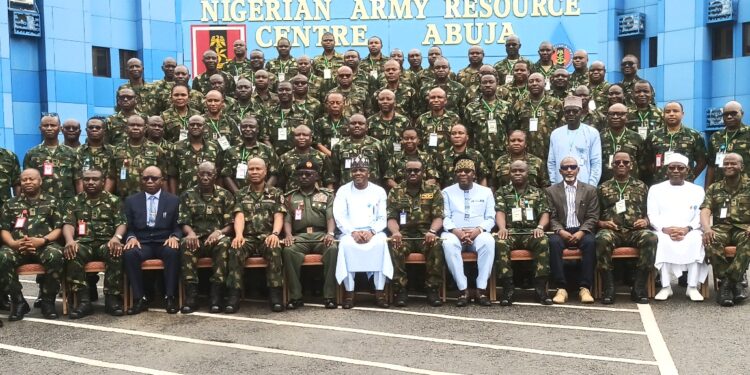Operational Commanders in the North West have been charged to up their games by promptly attending to administrative needs of their troops to strengthen moral component of Nigerian Army’s fighting power.
The Chief of Army Staff, Lt.-Gen. Taoreed Lagbaja, gave the charge at the closing of a three-day Retreat for Past and Present Commanders of Operations in North West, on Wednesday in Abuja.
The retreat with the theme, “Reappraising the Nigerian Army’s Approach to Tackling Insecurity in the North West,” was hosted by the Nigerian Army Resource Centre (NARC) Abuja.
The army chief was represented by the Chief of Operations, Maj.-Gen. Boniface Sinjen.
According to him, it is apparent that commanders in the northwest zone must be courageous, ingenious, innovative, critical thinkers and good communicators.
Lagbaja said that the senior commanders must continue to encourage their subordinates to seize splitting opportunities and exercise mission command.
He also charged them to fully embrace cooperation and collaboration in their operations, reiterating that army must relate and work closely with other agencies and services involved.
According to him, it is through collaborative effort that we can ensure that Nigerians go about their daily chores without fear of any form of harassment or intimidation.
“This is because the Northwest zone is a major trade axis in the country; it must be secured for the benefits of the entire nation.
“Commanders must up their gains and attend to the administrative needs of their subordinates promptly to strengthen the moral component of our fighting power,’’ he said.
The army chief said the retreat had helped them to clarify events, strengthen the positives and correct shortcomings in army operations in the Northwest.
He said the various recommendations made would assist in the review of current happenings on the ground for better performance by the army.
According to him, the jailbreak and escape of hardened insurgents and terrorists from the high-security prison in Koutoukale Prison in Niger Republic on July 11, is a pointer to the requirement for this retreat.
“The incident serves as a pointer to the need for a review of the entire security arrangement in the northwest zone given the long stretch of the common boundary of more than 1400 km between Nigeria and Niger Republic.
“I believe we have been able to reduce the spikes of kidnapping, banditry and adoption in rural communities in the zone.
“However, our concern is now on the shift of these criminals to urban centres in the entire northwest.
“One major objective of this retreat, therefore, was to examine the operational logistics, administrative factors and interagency cooperation and collaboration in the zone.
“This necessitated the call to our senior colleagues who have operated in the area before disengaging from the service,’’ he added.
The Director-General, NARC, retired Maj.-Gen. Garba Wahab, said that all the operations being conducted by the armed forces were in joint efforts with other security agencies.
Wahab said the retreat was aimed at appraising the Nigerian army operations looking at their performance in terms of strength and shortcomings as well what could be done for a better performance.
He said that the Nigerian military, especially the army, had what it takes to address the challenges but required the support of all stakeholders and the society to succeed. (NAN)











